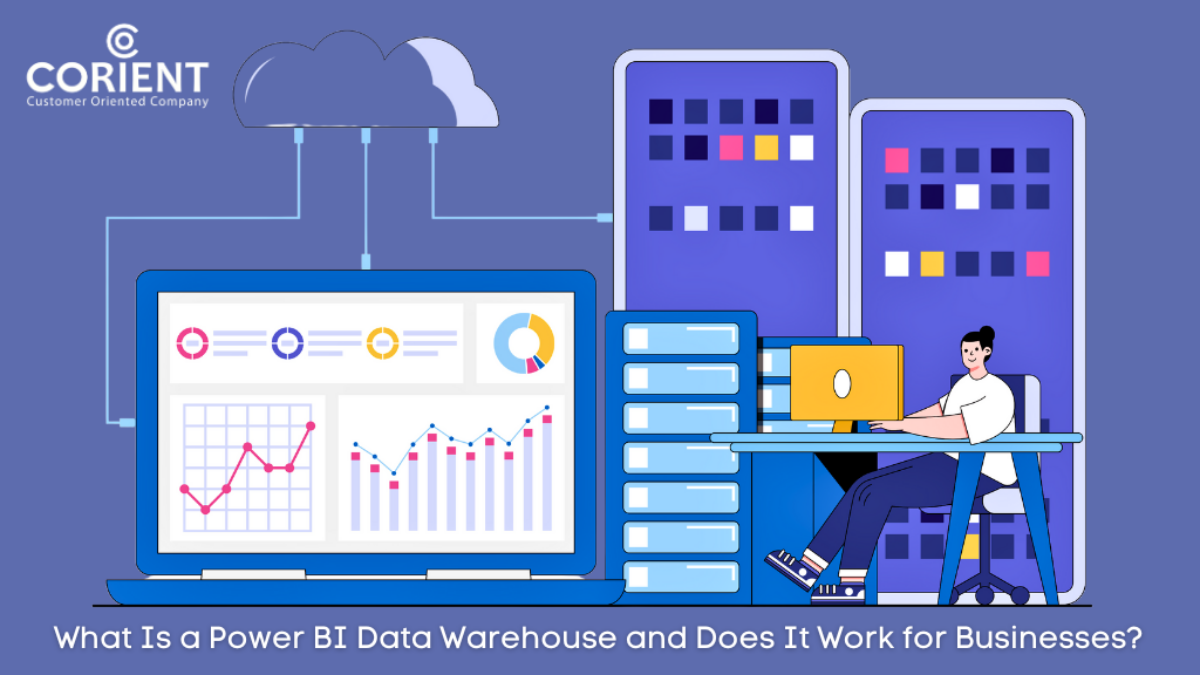An enterprise-level solution that provides a full toolkit for managing data in databases, excel sheets, and other forms is a Power BI data warehouse. Additionally, with integrated BI tools, it allows users to leverage the power of analytics.
A data warehouse is the main location where the data in your company is kept. Usually hosted on a fast server, its purpose is to assist you in analysing your data in ways that are beneficial to your company.
An essential distinction between a Power BI data warehouse and an elemental report is that the latter’s scope is more constrained. Large amounts of data can be analysed using the latter at the same time.
Power BI data warehouse enables you to easily accumulate whole company’s data into one area so you can view it from any device at any time. Additionally, you will be able to share this data with other departments inside your company, allowing one department to obtain additional information without having to contact people in other departments.
What is meant by BI?
Business information management and data analysis techniques and technology are together referred to as business intelligence, or BI. Through the use of techniques like data mining, process analysis, and performance benchmarking, business intelligence (BI) in data warehouse systems offers historical, present, and predictive insights of corporate processes. Organizations can detect business issues, recognize market trends, and enhance their decision-making procedures by utilizing BI.
BI is about people and procedures as much as technology. Collaboration between IT and business teams, together with a clear grasp of business goals and objectives, are essential for a successful BI implementation. Organizations may make sure that their BI initiatives provide value and propel business success by coordinating BI strategies with business objectives.
What is BI in Data Warehouse (DWH)?
Since BI acts as the main store for all corporate data, it plays a crucial role in data warehouses. Reliability and consistency are ensured by combining data from multiple sources. By giving users a single view of the data, the DWH optimises query efficiency and facilitates complicated analysis. By quickly accessing and processing the data, BI tools made possible by this centralization are able to produce insights that inform key business choices.
Data analysis and reporting in data warehouses are based on business intelligence (BI). Organisations can utilise their data for strategic planning, performance management, and decision-making by having access to a dependable and scalable data infrastructure. Data warehouses are essential for releasing the potential of massive data volumes because of their capacity to manage intricate queries.
How Data Warehouse can be beneficial for your Business?
A data warehouse design is used to store, manage, and analyse data from a variety of sources. Data warehouses are one of the numerous types of databases. Data warehouses offer a centralized location for company data that is available to many users and applications. They provide information on business performance and assist in allocating resources.
Various Benefits of using Data Warehouse:
- Sheds light on the workings and procedures of an organisation.
- By offering deeper insights into what functions well and requires improvement, it aids in the optimisation of resource allocation.
- The time required to handle and evaluate data is decreased by data warehouses’ quicker access to information.
- Enables quicker decision-making.
- Prior to obtaining information from other sources, a data warehouse enables you to swiftly access information and make better judgments.
- To find out if there has been a shift in customer behaviour or product demand over time, for instance, compare sales orders your business gets online with orders placed earlier in the day.
- Makes it possible to make more informed selections concerning marketing tactics.
- To analyse where your business needs improvement or where it is outperforming its rivals. A well-designed data warehouse can be utilised for benchmarking against industry standards and performance data from other businesses.
- Major advantage of adopting a data warehouse gives you the ability to see whole organisations data at one place and time, for all users who have the access.
How Data Warehouse and Business Intelligence are different?
Despite of being closely related business intelligence and data warehouse have different functions within an organisation’s data strategy.
Data Warehousing:
Majorly focuses on managing and storing massive amounts of data from various sources. Another main function is that it arranges data to make it conveniently accessible for reporting and analysis.
Business Intelligence:
BI function is to conduct analysis and produce insight based on the information stored in warehouse. There are variety of analytical procedures such as data mining, predictive analytics and reporting. BI converts unstructured data into relevant information.
There are multiple steps involved in data analysis using a BI in a data warehouse. Initially, information is taken out of, processed, and added to the data warehouse from multiple sources. The data is prepared for analysis and cleaned up as part of this ETL procedure. BI tools can access the data in the warehouse and use it for a variety of analyses, such as diagnostic, prescriptive, predictive, and descriptive analyses. While diagnostic analysis explains why something happened, descriptive analysis sheds light on what actually occurred, predictive analysis predicts future trends, and prescriptive analysis recommends course of action.
Essentially, business intelligence (BI) in data warehouses supplies the infrastructure needed to store data, while business intelligence (BI) tools are used to collect, analyse, and present the data to facilitate decision-making.
Conclusion:
Business intelligence data warehouses are essential to today’s data-driven businesses. Businesses may efficiently use their data to obtain insights and make wise decisions by knowing how various technologies interact. Furthermore, BI functions as the foundation of a data warehouse by offering a dependable repository for data, and BI tools process and interpret this data to produce insights that can be put to use. When combined, they help businesses find new possibilities, streamline processes, and keep a competitive edge in the marketplace.
Enterprises can gain a great deal from investing in data warehousing and business intelligence (BI) solutions, including better decision-making, more operational efficiency, and increased competitiveness. Organisations may turn their data into a strategic asset that drives growth and success by constructing a strong data infrastructure and utilising cutting-edge BI technologies.

